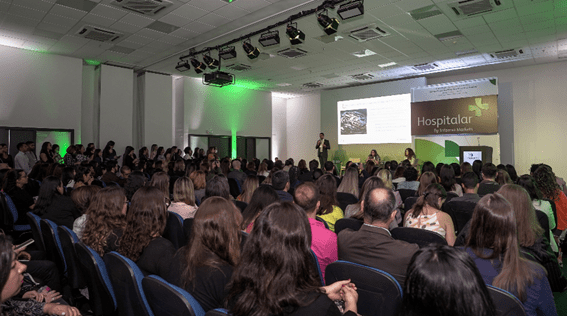ABIMED’s Regulatory Conference attracted great interest from the public

Publicado em 23/06/2023 • News • English
In partnership with the regulatory entities Anvisa, Inmetro, and Anatel, ABIMED held its Regulatory Conference at Hospitalar 2023, between May 23 and 25. It was a true public success, overcrowding the auditorium at times.
At the official opening of the Conference, Leandro Rodrigues Pereira, deputy director of Anvisa’s Fifth Board, spoke about the implementation of the new risk management plan for import processes, in March of this year, and emphasized that the Agency always seeks greater efficiency and improvement in the management of sanitary risks inherent in import processes.
The “Regulatory Model and the sector’s new perspectives” was the theme of Panel 2, with Marcelo dos Santos Monteiro, director of Conformity Assessment at Inmetro, who presented Brazil’s very challenging scenario, based on data from the Global Competitiveness Index (WEF 2019). In response to the question: “In your country, how costly is it for companies to comply with public administration requirements (licenses, regulations, reporting), Brazil scored 11.4, which places it at the bottom of the ranking of 141 countries.
In Panel 3, the criteria for the compassionate use of medical devices were presented by speaker Alessandro Ferreira do Nascimento, from the Coordination of Clinical Research in Health Products (CPPRO) of Anvisa’s Third Board. The compassionate use programs for medical devices are those in which an innovative solution, not yet registered at Anvisa, is in the process of validation.
Regulatory convergence
Regulatory convergence and reliance mechanisms for medical devices was the focus of Panel 4, conducted by Augusto Bencke Geyer, from the General Management of Health Product Technology (GGTPS) of Anvisa’s Third Board. He reminded that “global converged regulation brings us closer to a transparent, predictable, and reliable standard, thereby accelerating patient access to safe, effective, and quality medical devices.”
The Technology Equipment Manager (GQUIP) of Anvisa’s Third Board, Anderson de Almeida Pereira, explained about the Technical Dossier, in compliance with RDC (Collegiate Board of Directors Resolution) 751/2022, at Panel 5, highlighting the required responsibilities for the document and the importance of keeping it up to date.
During Panel 6, Daniela Marreco Cerqueira, deputy director of Anvisa’s Third Board, talked about the changes allowed by RDC No. 786, May 2023, which provides for the technical and sanitary requirements for the operation of clinical laboratories, pathological anatomy laboratories, and other services that perform activities related to Clinical Analysis Examinations (EAT).
Link to watch: https://www.youtube.com/@abimed8617/videos
Software as a medical device and cybersecurity
Panel 7 of the Regulatory Conference had two representatives from Anvisa, focusing on “Guidelines to the industry for the improvement of the GEMAT (Material Management) and CMIOR (Orthopedic Implantable Materials Coordination) processes and regularization of software as a medical device”. The speaker Marcia Ribeiro, from the Third Board, explained in detail all the chapters that shall compose the structure of the Technical Dossier. Francisco Iran Cartaxo Barbosa, a specialist in Regulation and Health Surveillance – GQUIP of the Third Board, focused on medical software regulation, highlighting that “good regulation uses the simplest rules to achieve its objectives at the lowest cost through the correct motivation of those involved.
On the topic of cybersecurity (Panel 8), the speaker Helio Bomfim de Macedo Filho, advisor to the General Management of Health Product Technology of Anvisa’s Third Board, revealed that about 94% of health institutions say they have already been the target of cyber attacks, according to a research by the SANS Institute in the United States (2014). In the context of MD, Bomfim said, cybersecurity is the protection of connected devices and other information systems from cyber threats and other unauthorized activities.
Talking about the scenario in Brazil, which defined its regulatory framework in 2020, the specialist sees several challenges: a country of continental dimensions, with very diverse technological realities, and a healthcare sector that lacks security professionals. He believes that good practices within the topic should comprise shared responsibility between manufacturers, healthcare services, regulatory bodies, and patients.
At the closing of the Regulatory Conference, Jamilson Ramos Evangelista, Anatel’s Certification and Numbering Manager, approached the Agency’s homologation for medical equipment. He explained aspects of the General Telecommunications Law – law 9472, of July 1997, which organizes the exploration of telecommunication services, in which the Radio Frequency spectrum, used in several health equipments, is included.
Link to watch: https://www.youtube.com/watch?v=8Wncjge3OFM&t=11s

 Portuguese
Portuguese
 Spanish
Spanish
 English
English






















